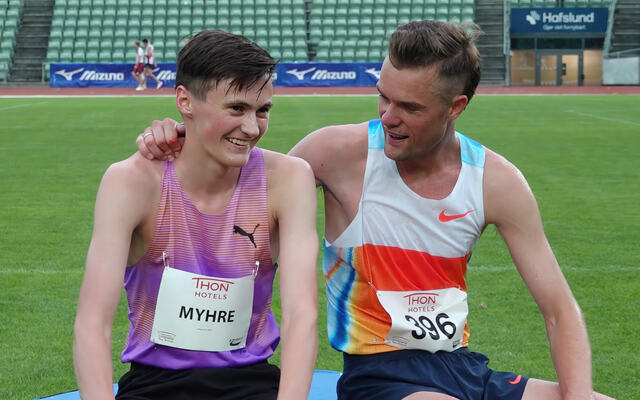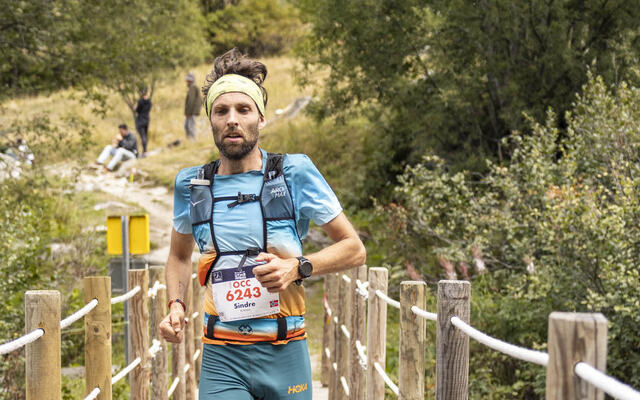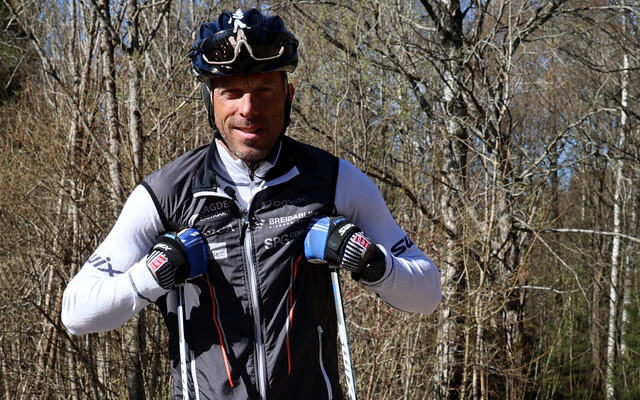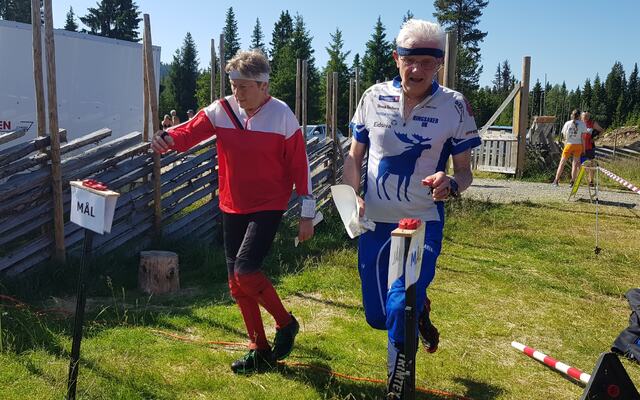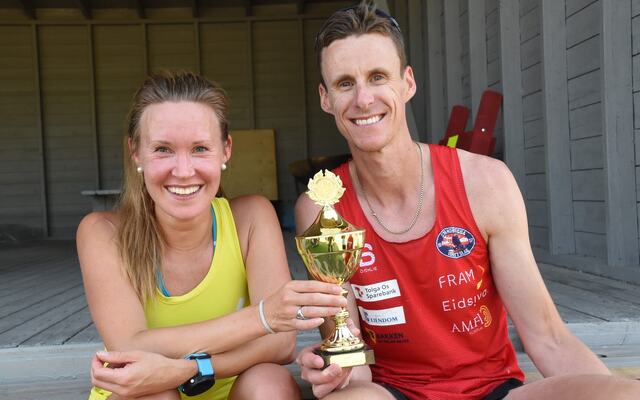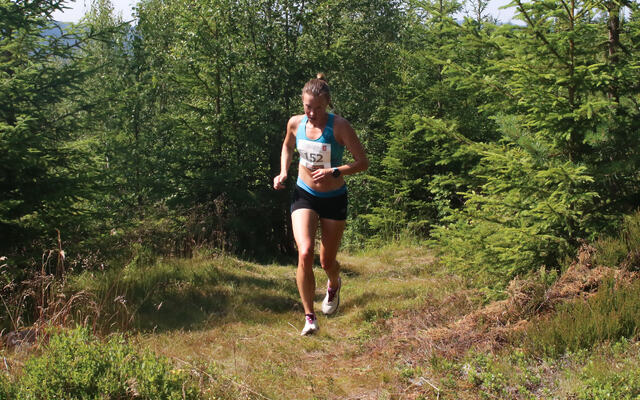| forhåndsomtale | ||||
| ||||
| Kilde: Ultramarathon World Kotov and Kelehe showdown at Comrades World's greatest ultramarathon set for June 16, 2003 By Riel Hauman Ultramarathon World Durban, South Africa (UW) - Two questions seem to dominate this years Comrades ultramarathon, to be run between the South African cities of Pietermaritzburg and Durban on Monday, June 16. The first is: Which of two runners whose surnames start with a K will win? And: Will a South African woman cross the line first? The worlds largest ultramarathon will be contested for the 78th time. It is a down run this year, finishing in coastal Durban, and the distance is 89.179 km. The total number of entries is 13,310 an increase of 9.5% over last year (and 35% for women). The international challenge to the locals will again be strong, as it has been since 1994. Over the past ten years only three South African men have won the race, all on the down run. One of them is the current down run champion, Andrew Kelehe, and he will be up against the man who has dominated the last two up runs, the other K Vladimir Kotov. The quiet, unassuming Kelehe was a national hero in 2001 when he ended a three-year international winning streak with a dramatic win after speeding away from Russian Leonid Shvetsov about 10 km from home. Kelehes 5:25:51 is the second fastest in the history of the down run, slower only than Bruce Fordyces magnificent 5:24:07 record of 1986. Record talk There has been much talk about a record this year. Fordyce covered 88.7 km in 1986, i.e. 3:39 per kilometre. The course this year is about 170 m longer than in 2001. Kelehe has not said in so many words that he will go for the record all coach John Hamlett was prepared to state was that if he felt good on the day, then the country would see the best of him. Hamlett took full responsibility for Kelehes poor performance last year. I believe he was overtrained by two weeks. I dont believe it will happen again. Kelehe started well in 2002, but then faded to ninth (his worst position since 1996). The urge is back, Hamlett added. The hunger is there as well he is looking perfect to win. Two weeks ago Kelehe did his usual four-hour training run and covered the distance in 3 hours 30 minutes. The rest of his preparation followed its normal consistent out-of-the-limelight pattern, with little racing. Kelehe does not like granting interviews, because he believes it interferes with his focus. Kelehes storming run in 2001 showed that he has the speed to finally replace Fordyce as record holder. If, as Hamlett said, he is in the same shape as he was then and has a trouble-free run, then the chances are indeed good that South Africa will have one of its own as the winner of its premier ultra race. Dedicated to father Kelehe dedicated his previous win to his daughter, who had died a few months previously; this time he is dedicating his run to his father, who died in December. But Kelehe will have to get to the finish before Kotov, who many believe has the best credentials to win and break the record. He smashed the up record in 2000, repeated the win last year, and could have won in 2001 if he had started his run for home sooner. Proverbially tough as nails, the Belorussian, who now resides permanently in South Africa, has worked on his speed over the shorter distances in the past year. His dedication to the Comrades is as single-minded as Kelehes, with the only differences being that he races more and goes to his native Eastern Europe for his final few weeks of training. He won the Kuala Lumpur Marathon in February in 2:33:37, had a low-key Two Oceans Marathon this year (only 25th) and on paper is much faster than his rival. Of course, speed on paper and speed after 80 km of muscle-destroying downhills is not the same thing. Two years ago the faster Kotov relentlessly cut Kelehes lead on the descent into Durban, yet still finished 90 seconds behind. Experts also point out that Kotov has done better on the up run, which seems to suit him more. But it is certain that Kotov would dearly like to become the first since Fordyce in 1988 to win two years in a row, and also the first since Fordyce to hold both records at the same time. If he wins, the former USSR marathon record holder will, at 45, also be the oldest champion since Wally Hayward in 1954. The third 'K' There is a third K who could be among the top finishers: Oleg Kharitonov (RUS), running in his third Comrades. On the previous down run he was twelfth and last year fourth in 5:34:43. Since then he has set a new world best for 100 miles on the track, ranked third in the world for 2002, improved his marathon time and looks set for another gold medal. And there is another South African whose time may have come. Willie Mtolo will certainly believe that he has now served his apprenticeship. Mtolo, a former winner of the New York City Marathon, fought Kotov shoulder to shoulder last year before admitting defeat and settling for his second runner-up spot (the previous one was in 1989). Mtolo hails from the province of Kwazulu-Natal, where the Comrades is run, and will again receive the support of thousands along the route. The Comrades being the gruelling race that it is, a couple of surprises will surprise no one. My prediction of the ten gold medalists, in no particular order, is: Kotov, Kelehe, Mtolo, Kharitonov, Sarel Ackerman (RSA), Michael Mpotoane (RSA), Jorge Aubeso Martinez (ESP), Dmitry Grishine (RUS), Elias Mabane (RSA), Fusi Nhlapo (RSA). In the womens race the main local hope, Farwa Mentoor, has an even more formidable array of top-class international runners to contend with. First South African last year in her debut Comrades, Mentoor has grown considerably in stature and confidence. Her dream, she said recently, was to win the Comrades for South Africa. Maria Bak She will be up against the most successful runner in the history of the race. In her six efforts since 1995 German Maria Bak (44) has finished first, second, second, first, fourth and first. Like Kotov, she seems to perform better on the up run. Still, her 6:00:28 on the 1997 down run is third only to Ann Trason (USA), who beat her that year in 5:58:25, and Frith van der Merwe, who holds the record with 5:54:43. In the last down run Bak was beaten rather easily, finishing fourth almost 12 minutes behind Elvira Kolpakova (RUS) but, like Kotov, she is sure to put in a special effort this time to make amends. She ran an easy Two Oceans and will be very hard to beat. Mentoor had much the same preparation as last year, only concentrating a little more on downhill running. She won the Soweto Marathon and in the Two Oceans ran about 6 minutes faster than in 2002 to finish third. In the recent False Bay 50 km she recorded a relaxed 3:46:29 and followed that with a quick 83:09 in the John Korasie Half Marathon. No S.A. woman has won the race since Rae Bisschoff in 1998, but there is little doubt that the very determined Mentoor can do so. Three other women will bear watching. Kolpakova is the defending down run champion. Her winning margin of 9:11 in 2001 was the biggest for a down run since 1995 and she was ranked top ultramarathoner in the world that year. She was fourth in the Two Oceans, one place behind Mentoor. Serious challenger Simona Staicu (HUN) won the Two Oceans in her first attempt at an ultramarathon. The fastest marathoner in the field, she may find the Comrades distance a little tougher to crack than the Two Oceans, but the ease with which she romped through the shorter event marks her as a serious challenger. South African newcomer Yolande Maclean (25) has taken the road running scene by storm in the past year. Outstanding among her achievements was breaking Van der Merwes course record in the Loskop 50 km by more than 2 minutes a week after setting a marathon personal best of 2:50:53 (on a downhill course). Concerns have been expressed that Maclean appears to be following the same frenetic racing schedule that led to Van der Merwes demise and another concern about the novices arrogant reaction: I know exactly what I am doing. She has the talent; the question is whether she can handle the distance and the hills. The gold medals could go to: Bak, Mentoor, Staicu, Kolpakova, Maclean, Marina Bychkova (RUS), Grace de Oliveira (RSA), Sarah Mahlangu (RSA), Tatyana Zhirkova (RUS), Renée Scott (RSA). Both male and female winner will receive R160,000 ($20,000 ); the course record incentive is a 100-ounce solid gold statuette of Hermes, while the first South African man and woman will win a 25-ounce gold statuette. But only a select few can win these prizes. The rest of the multitude will be helped along the way by, among other refreshments, 300,000 sachets of energy drinks, one million sachets of water, and 500 kg of cooked potatoes. < |
forhåndsomtale
Siste medlemssaker
Annonse


